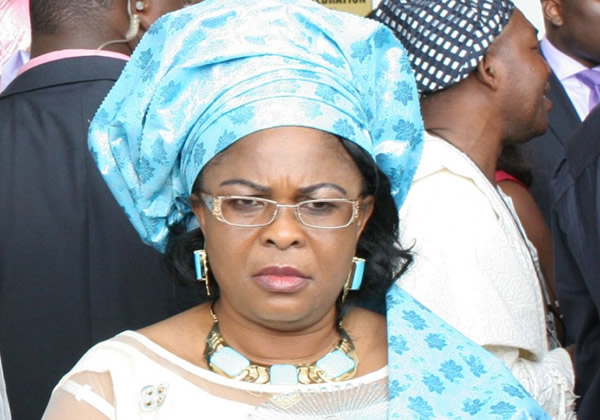 |
| Patience Jonathan |
A Federal High Court in Lagos State on Monday reserved judgment until February 28 in a suit seeking final forfeiture of $8.4m (about N7.4bn) allegedly linked to former First Lady Patience Jonathan’s account.
The Economic and Financial Crimes Commission had secured an interim order for forfeiture of the sum before Justice Mojisola Olatoregun on April 20, 2018, through an ex parte application.
In the suit, EFCC joined as respondents: Jonathan, Globus Integrated Services Ltd., Finchley Top Homes Ltd., Am-Pm Global Network Ltd., Pagmat Oil and Gas Ltd., Magel Resort Ltd., and one Esther Oba.
On October 29, 2018, EFCC counsel, Mr. Rotimi Oyedepo, moved a motion for final forfeiture of the sum; while defence counsel, Messrs Ifedayo Adedipe (SAN) and Chief Mike Ozekhome (SAN) opposed the application.
On January 15, the court admitted as an exhibit, electronic evidence showing business outfits of the third respondent, Finchley Top Homes Ltd.
The court then adjourned for judgment.
On Monday, the case was further adjourned until February 28, as the judge was said to be on another official assignment.
The News Agency of Nigeria reports that in moving the application for final forfeiture dated May 8, 2018, Oyedepo supported it with an affidavit deposed to by Mr. Chukwuma Orji, an EFCC operative.
He told the court that he relied on written averments as well as exhibits EFCC 12 and EFCC 13 to make the application.
He prayed the court to grant the application.
Opposing the application, Mrs. Jonathan’s counsel, Adedipe, urged the court to refuse the application on the grounds that sufficient facts had not been placed before it to warrant a final order.
According to Adedipe, the EFCC only claims that it found money in Jonathan’s account and reasonably suspects that it is a proceed of unlawful activities but failed to invite her or take other necessary preliminary steps before seeking an order of forfeiture.
Adedipe said that the practice fell short of prosecutorial procedures.
He argued that the depositions by the applicant that the funds represented proceeds of unlawful activities had yet to be substantiated, according to Section 36 of the 1999 Constitution.
He noted that Section 36 provides, “A person shall not be convicted of an offence unless the offence is defined and punishment prescribed.’’
According to him, there is no crime known as “statutory suspicion and so, the onus rests on the EFCC to prove that the respondent has such an amount of money, and that it was obtained under false pretences or fraud.
Counsel to the third to sixth respondents, Chief Mike Ozekhome (SAN), argued that according to the provisions of the Advanced Fee Fraud Act, the application was premature, as the affidavit of the third respondent to show cause, had yet to be taken.
According to him, it is when it has been argued and the court finds no merit in it that the applicant can be justified and better placed to bring the final forfeiture application.
Ozekhome also told the court that the third respondent made money from selling groceries and drinks, among other items.
In this article:
